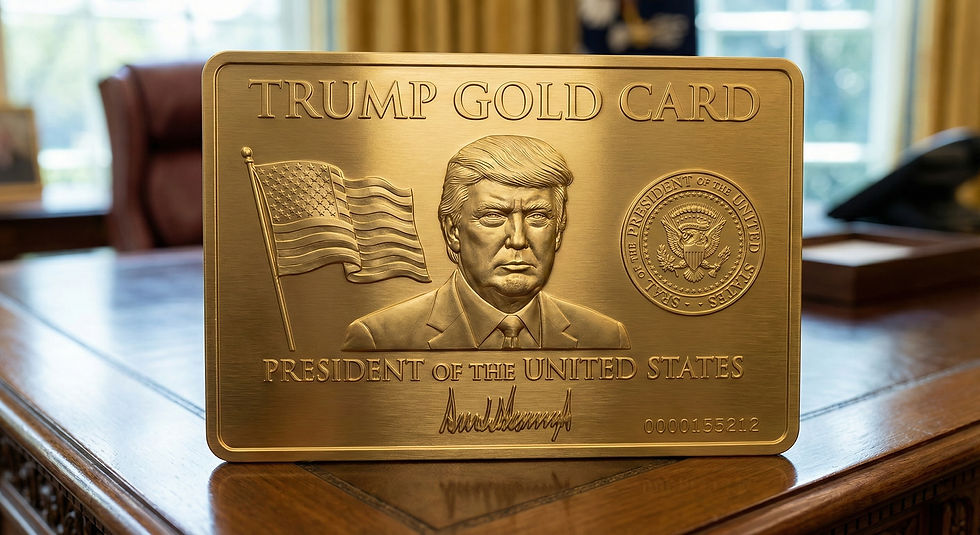Top 5 EB1 Extraordinary Ability Green Card Questions
- globaltalentlaw

- Nov 27, 2023
- 6 min read
Introduction
The EB1 visa, often referred to as the "extraordinary ability green card," is a coveted immigration pathway for foreign nationals who have achieved significant recognition in their respective fields. Whether you're a scientist with groundbreaking research, an artist with international acclaim, or a business professional who has played a leading or critical role in your industry, the EB-1 visa offers a route to U.S. immigration that recognizes your outstanding achievements. In this article, we'll address the top five questions surrounding the EB-1 visa, providing clarity on its application process, eligibility criteria, and more.

1. What is the EB1 Green Card?
The EB-1 green card, formally known as the "Employment-Based Immigration: First Preference EB-1," is a category of immigrant visas reserved for individuals who demonstrate extraordinary ability in their field, whether it be the arts, sciences, education, business, or athletics. The EB-1 visa is divided into three primary categories:
EB-1A (Extraordinary Ability): This category is for individuals who can demonstrate extraordinary ability through sustained national or international acclaim. Such recognition can come in the form of major prizes, awards, or a significant body of work recognized by experts in the field.
EB-1B (Outstanding Professors and Researchers): Reserved for scholars and educators who have made significant scholarly research contributions and have at least three years of teaching or research experience.
EB-1C (Multinational Managers or Executives): This category is for managers and executives who have worked for a company abroad for at least one year in the past three years and are seeking to continue their employment with the same company in the U.S.
While the EB-1 green card offers a faster route to becoming a lawful permanent resident compared to other employment-based immigrant visas, it demands strong evidence of extraordinary ability to be successful.

2. How do you prove extraordinary ability for EB-1A?
Proving extraordinary ability for the EB-1 visa requires a meticulous compilation of evidence that showcases one's achievements and recognition in their respective field. Here's a breakdown of how applicants can demonstrate their extraordinary ability:
Major Awards and Recognitions: Possessing a major internationally recognized award, such as a Nobel Prize or an Olympic Medal, can serve as evidence. However, in the absence of such awards, a combination of other significant accolades can be presented.
Membership in Associations: Being a part of associations or organizations that require outstanding achievement evidence for membership can bolster one's application.
Published Material: Articles or features about the applicant in major media or professional publications can serve as evidence of recognition. This includes both authored works and those written by others that highlight the applicant's contributions.
Judging the Work of Others: Serving in a critical role as a judge, whether individually or on a panel, especially for the work of peers in the same or an allied academic field, can be presented as evidence.
Original Scientific, Scholarly, or Business-Related Contributions: Demonstrable contributions of major significance in one's field can be a strong point in the application.
Scholarly Articles: Publications in scholarly journals, especially those that have been cited by others, can be used as evidence.
Exhibitions or Showcases: For artists and performers, having work showcased in artistic exhibitions or leading venues can be a testament to their extraordinary ability.
High Salary or Other Significantly High Remuneration: Earning a high salary in relation to others in the field can be indicative of one's extraordinary ability.
Commercial Successes: For those in the arts, box office receipts or record, cassette, CD, or video sales can be used as evidence.
Comparable Evidence: If the standard criteria don't readily apply, applicants can submit comparable evidence to make their case.
If an applicant can meet at least 3 of the criteria listed above then, USCIS will look at the totality of the evidence submitted to determine whether the applicant is one of the few working at the top of his or her field. It's essential to note that merely meeting the criteria isn't a guarantee of visa approval. The evidence should collectively paint a picture of sustained national or international acclaim. Consulting with an immigration attorney can provide tailored guidance on compiling a robust application.
3. What is the process for obtaining an EB-1 green card?
There are 2 parts to an EB-1 green card: The first part is the I-140 Petition for Alien Employer. This is the part of the green card process where you have to prove to USCIS that you qualify for the high level of Extraordinary Ability required for approval. This petition must be filed with USCIS.
The second part of the process is either Adjustment of Status or Immigrant Visa Consular processing. During this phase, USCIS or the Department of State are verifying your identity, checking your criminal history and checking your US immigration history to ensure that you are “admissible” to the U.S.
Adjustment of status is the process of changing from a non-immigrant visa status over to permanent resident status within the U.S. Applicants who apply for adjustment of status are not able to travel internationally while the AOS application is pending. AOS applicants are usually not interviewed by USCIS and receive their green cars in the mail.
If the applicant must travel internationally during the second phase of the process, then s/he may choose to consular process. Applicants who consular process their immigrant visa are able to travel internationally while the process is pending. Immigrant Visa applicants are required to attend a medical exam and consular interview in their home country. Processing time for Immigrant Visa consular processing varies widely from country to country.

4. How long does EB-1 extraordinary ability green card take to process?
The processing time for the EB-1 Extraordinary Ability visa can vary based on several factors, including the applicant's country of origin, the volume of applications received by the U.S. Citizenship and Immigration Services (USCIS), and any additional checks or verifications required. Here's a general overview:
I-140 Petition Processing: The initial step in the EB-1 process is filing the I-140, Immigrant Petition for Alien Worker. The processing time for the I-140 petition typically ranges from 9 to 15 months. However, applicants can opt for premium processing by paying an additional fee, which guarantees a response from USCIS within 15 calendar days.
Priority Dates and Visa Bulletin: Once the I-140 is approved, the applicant's priority date (the date USCIS receives the I-140 petition) becomes crucial. The U.S. Department of State publishes a monthly Visa Bulletin that indicates which priority dates are currently being processed. For many countries, EB-1 visas are current, meaning there's no waiting time. However, for countries with high demand, there might be a backlog.
Adjustment of Status (I-485) or Consular Processing: If the applicant is already in the U.S., they can file for an adjustment of status using Form I-485. This process can take 8 to 14 months. If the applicant is outside the U.S., they'll undergo consular processing in their home country, which can take an additional few months.
Additional Factors: Delays can occur if the applicant receives a Request for Evidence (RFE) from USCIS, requiring them to submit additional documentation. Security checks and the applicant's individual circumstances can also influence processing times.
In total, the EB-1 Extraordinary Ability visa process can take anywhere from 1 to 2 years, though this is a general estimate and individual experiences may vary. It's advisable to consult with an immigration attorney to get a more precise timeline based on one's specific situation.

5. How can I prepare for my consultation with an attorney?
In order for an attorney to properly advise you, the attorney must have as much information as possible about your background. In order to best prepare for your consultation, you should update your resume/CV to ensure it highlights your most important achievements and provides a comprehensive overview of your employment history.
You should also read over the list of criteria that USCIS will assess and make notes about how you may meet each criteria. Don’t be shy! If there’s something in your background that you think may meet the criteria, let the attorney know and they can advise whether it’s useful or not.
Conclusion
The EB-1 Extraordinary Ability Visa offers a unique pathway for talented individuals to make their mark in the U.S. While the process may seem daunting, with the right information, meticulous documentation, and expert guidance, the journey can lead to fruitful outcomes. If you or someone you know is considering this pathway, it's essential to seek professional advice. The Global Talent Immigration Law Group is committed to assisting talented individuals in realizing their American dream. With a deep understanding of immigration law and a dedication to excellence, our team is poised to guide you every step of the way.
Contact Global Talent Immigration Law Group today for a free EB-1 Extraordinary Ability Green Card consultation. Let our expertise be your beacon in navigating the complexities of U.S. immigration.
As with all immigration pathways, staying informed, being proactive, and seeking expertise when needed can make all the difference.
References
U.S. Citizenship and Immigration Services (USCIS) - EB-1 Visa Guidelines
American Immigration Council - Understanding the EB-1 Visa
Immigration Law Journal - Various articles on EB-1 visa criteria and processes





Comments